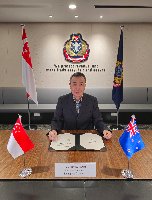FY18 Results and Full Year Report
MEDIA RELEASE
Monday, 13 August 2018
Relentless focus on cost efficiency offsets headwinds in wholesale markets to leave operating free cash flow stable; distributions to shareholders rise
Highlights
| Year ended | Comparison against | |
| 30 June 2018 | FY17³ | |
| EBITDAF[1] | $481m | down 4% from $501m |
| Profit | $132m | down 13% from $151m |
| Earnings per share (cents) | 18.4 cps | down 12% from 21.0 cps |
| Underlying profit1 | $130m | down 9% from $142m |
| Underlying profit per share (cents) | 18.1 cps | down 9% from 19.9 cps |
| Declared dividend (cents) | 32.0 cps | up 23% from 26.0 cps |
| Operating free cash flow2 | $301m | down 1% from $305m |
| Operating free cash flow per share (cents)2 | 42.0 cps | down 1% from $42.6 cps |
| Capital expenditure (accounting) | $69m | down 32% from $102m |
• Cost efficiency programme delivering, with cash spent on stay in business capital projects down by $38 million (33%) and a $20 million (8%) reduction in ongoing other operating costs
• Conditional agreements reached for the sale of the Ahuroa gas storage (AGS) facility for $200 million and the sale of the Rockgas LPG business for $260 million.
• Strong operating free cash flow saw Contact strengthen the balance sheet, with a cash reduction in borrowings of $99 million, while at the same time increasing returns to shareholders with the full year dividend up 23%, to 32 cents per share (FY17 26 cents per share) which will be fully imputed for New Zealand based shareholders.
[1][2]
Putting our energy where it matters
Contact’s strategy remains to optimise the Customer and Generation businesses to deliver strong cash flows for distribution to shareholders. The strategy is underpinned by a disciplined and transparent approach to operating and capital expenditure.
“Despite a testing operating environment which included a second successive year of below average hydro inflows and a continuation of the intense retail competition with an ever growing number of start-ups and reinvigorated incumbents, Contact showed strong financial discipline to deliver operating free cash flow of $301 million despite lower operating earnings by reducing operating costs and stay in business capital expenditure by $58 million”, said Dennis Barnes, Contact’s Chief Executive.
Contact reported a statutory profit for the year ended 30 June 2018 of $132 million, $19 million lower than the prior corresponding period as EBITDAF fell by $20 million, or 4%, to $481 million. Operational improvements resulted in a sustainable reduction in operating costs of $20 million, 8% down on the prior comparative period. Operating free cash flow remained strong at $301 million, down 1% on FY17.
“In the last year we also announced two significant transactions, they stand out as key enablers to accelerate the delivery of our strategy - the sale of the AGS facility, and the sale of the Rockgas LPG business. Although on face value they seem like simple disposals at a fair price, they build significant flexibility into our business. With AGS we retain access to long-term gas storage services to meet our flexible thermal generation requirements without the need to own and operate a gas storage asset. Similarly, the Rockgas sale frees Contact from the fulfilment aspects of the LPG business while still being able to sell the product to our mass market customers which we know is something they value. The sales proceeds will be applied to debt, strengthening our balance sheet”, said Mr Barnes.
Contact’s quality generation assets and lean, low cost operations provide the Board confidence in the sustainability of Contact’s cash flow generation which allowed for the FY18 full year dividend to be increased by 23% to 32 cents per share, compared to 26 cents per share for FY17. The final dividend of 19 cents per share will be fully imputed for New Zealand based shareholders.
Connecting with our customers
Contact’s Customer business continues to reduce the cost to serve while improving the customer experience.
“Our Customer business aspires to be a high-performing, efficient retailer with the lowest cost to serve and best customer experience of the tier 1 retailers in New Zealand, and we are beginning to see good evidence of progress with stronger customer advocacy and lower churn”, said Mr Barnes.
Customer experience improvements saw a final quarter Net Promoter Score of +20, up 25% on the prior comparative period while operational efficiencies led to an 11% reduction in the cost to serve customers. This has contributed to customer churn being 1.3 percentage points below the market average and marginally improved mass market electricity and gas earnings.
Despite the operational improvements in mass market retailing, the Customer business result was impacted by market headwinds. In particular, increased competition in the Commercial and Industrial electricity segment reduced retail margins, and rising oil prices increased the cost of LPG which was not fully passed through to customers. Customer EBITDAF fell by $9 million to $109 million in the year ended 30 June 2018 when compared to the same period a year ago.
“The New Zealand energy market remains highly competitive, and with more retailers competing for attention it is more important than ever that we can distinguish our products and services in the eyes of customers. This has been a key consideration in the launch of our new brand. This is an outward symbol of the effort to transform Contact into a truly customer-centric digital energy company” said Mr Barnes.
Generating for the future
“Our Generation business has the goal to be an innovative, safe and efficient generator working with business customers, partners and suppliers to decarbonise New Zealand’s energy sector. While this will be a multi-year journey, I am encouraged that our continuous improvement programme is starting to deliver sustainable reductions in ongoing operating costs and an improvement in the resource utilisation of our renewable assets. This has resulted in record production from our geothermal power stations in the year and the cash cost of generation which includes both generation operating costs and generation stay in business capital expenditure down by $20m”, said Mr Barnes.
Generation EBITDAF fell by $13 million to $372 million in the twelve months to 30 June 2017 when compared to the same period a year ago, primarily as a result of ASX earnings volatility with the sudden hydrological swings. Contact also completed the claims settlement process in relation to construction contracts for the Te Mihi power station in FY18 which saw a reduction in year-on-year earnings.
“A key focus for the business is to support further decarbonisation of New Zealand’s energy sector. To achieve this we will need to work with partners and suppliers to assist the conversion of business customers with a high carbon footprint to renewable energy. Contact has the largest Commercial and Industrial customer base and is best placed to lead this transition. To ensure we can execute on this opportunity we have moved the Commercial and Industrial team into a new look Generation business, to be named Wholesale. This will enable demand-backed development of our consented geothermal resources, in preparation we are working hard to reduce the cost of our consented renewable development options. While the market fundamentals don’t currently support new renewable investment, it is something we will be ready for, especially as New Zealand looks to achieve its carbon reduction ambitions”, said Mr Barnes.
Looking forward
“The year ahead will see accelerated digital transformation in our lean Customer business and clear progress in efforts to decarbonise New Zealand’s energy sector.
Our new brand along with new customer inspired products and services and our low cost operations provide us with the platform to adapt to the evolving needs of our customers. Divesting Rockgas and transferring the Commercial and Industrial team to the new Wholesale business will also enable greater focus to accelerate the delivery of digitally led mass market customer experience improvements and continue to lower cost to serve and grow demand for renewable electricity.
Focusing on our core areas of advantage will be key to succeed in today’s markets and allow us to participate in those that are only just starting to emerge. For now the focus remains on the reduction of controllable costs, simplification of the organisation and asset portfolio and seeking opportunities to deliver value from scale efficiencies. This allows for increasing distributions to shareholders with Contact to target a FY19 full year dividend of 35 cents per share (up 9% on FY18)”, said Mr Barnes
ENDS
[1] Refer to slides 50-53
of the 2018 Full year results presentation for a definition
and reconciliation between statutory profit and the non-GAAP
profit measures earnings before net interest expense, tax,
depreciation, amortisation, change in fair value of
financial instruments and other significant items (EBITDAF)
and underlying profit (profit excluding significant items
that do not reflect Contact’s ongoing performance).
[2]
Refer to slide 29 of the 2018 Full year results presentation
for a definition and reconciliation between cash flow from
operating activities and the non-GAAP measure operating free
cash flow. Operating free cash flow represents cash
available to repay debt, to fund distributions to
shareholders and growth capital expenditure.
³ Contact
has elected to early adopt NZ IFRS 15 Revenue from Contracts
with Customers (‘revenue standard’) and NZ IFRS 16
Leases (‘leases standard’) for the year ended 30 June
2018. Both standards have been applied retrospectively,
which has resulted in the restatement and/or
reclassification of comparatives to conform to the current
period’s classification. Refer to slide 54 of the 2018
Full year results presentation for a reconciliation of the
changes to the prior period as a result of the adoption of
the new accounting standards.
Annual_report_2018_Contact_Energy.pdf
Contact_Energy___Annual_Results_investor_presentation_2018.pdf


 NIWA: Ship Anchors May Cause Extensive And Long-lasting Damage To The Seafloor, According To New Research
NIWA: Ship Anchors May Cause Extensive And Long-lasting Damage To The Seafloor, According To New Research New Zealand Customs Service: A Step Forward For Simpler Trade Between New Zealand And Singapore
New Zealand Customs Service: A Step Forward For Simpler Trade Between New Zealand And Singapore Horizon Research: 68% Say Make Banks Offer Fraud Protection
Horizon Research: 68% Say Make Banks Offer Fraud Protection NZ Banking Association: Banks Seek Government Support For Anti-Scam Centre
NZ Banking Association: Banks Seek Government Support For Anti-Scam Centre National Road Carriers: Praises NZTA State Highway Investment Proposal Turnaround
National Road Carriers: Praises NZTA State Highway Investment Proposal Turnaround Greenpeace: Cameras Reveal Mass Underreporting Of Dolphin, Albatross And Fish Bycatch By Commercial Fishing Industry
Greenpeace: Cameras Reveal Mass Underreporting Of Dolphin, Albatross And Fish Bycatch By Commercial Fishing Industry



